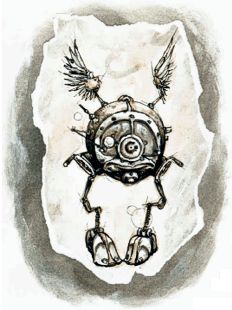
Monodrone (Base Modron):
These creatures make up the bulk of Mechanus’s population. They are small spheres with a single eye, wings, and two arm/legs. Monodrones are single-function modrons, assigned to simple labor or service in the regiments of the modron army. Thousands of the spherical monodrones, armed with spears, fouchards, and crossbows are impressive when marshaled against a foe with their unswerving, single-minded performance. They exist only for their work.
Monodrones are barely intelligent. They are unable to speak or read, but can understand commands spoken in the tongue of their race (although they will heed only a duodrone). Monodrones are capable of just one action at a time. Tell them to attack and they do so until slain, even if that means attacking each other after the enemy has been obliterated. Order them to guard and they guard without food or sleep. It is fortunate that they feed on the very substance of air around them; otherwise, it would be necessary to order them to eat every day.
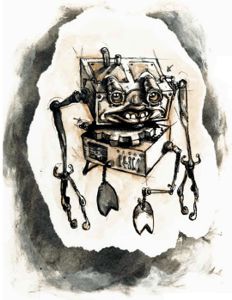
Duodrone (Base Modron):
Duodrones are bifunctional modrons that supervise 12 units of monodrones or perform complex tasks beyond the abilities of the monodrones. They are blocky, rectangular creatures of great strength. Like all modrons, they are absolutely loyal to the commands of their immediate superiors.
Capable of interpreting two commands at once, duodrones serve in the forces of the modron army as corporals and sergeants, or as special shock troops armed with thrusting and crushing weapons. Typically, they are given only a single command at a time, allowing them the limited ability to react. If ordered to attack, for example, they will do so until the enemy is slain and then seek out a new enemy, rather than attacking each other. Duodrones have limited conversational ability, but they can report their operations and observations clearly and completely. Duodrones have 90-foot infravision.
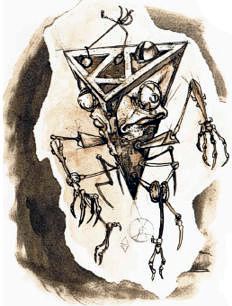
Tridrone (Base Modron):
Tridrones appear as three-sided pyramids with spidery arms and legs. They supervise squads of 12 duodrones, who in turn pass their orders to the monodrones. Tridrones can carry out multiple-task projects on their own. Typically, they receive a general order, which they divide into smaller tasks to be fulfilled by the duodrones. In the modron army, tridrones serve in special companies, equipped with three javelins per being, which they hurl before entering melee.
Tridrones are capable of reporting actions and observations and actually planning limited objectives on the battlefield. They speak their own language and the trade tongue of the multiverse.
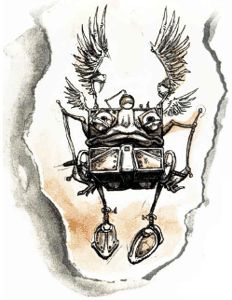
Quadrone (Base Modron):
The cubic quadrones comprise the upper level of worker modrons. They serve as field officers, and each battalion has a special “dozen-unit”, containing nothing but quadrone warriors. With their four arms, they are capable of wielding two bows at the same time. Some quadrones are winged (the wings replace one set of arms and negate the use of one bow) which are used for special missions or for aerial combat. As four-function creatures, quadrones can report actions and observations, make plans, react to unexpected occurrences, and act to remedy them.
All quadrones have senses equal to 150% of normal human standards. They enjoy 180-foot-range infravision. Equipped with sensory organs on all six sides of their cubic bodies, quadrones are never surprised under normal circumstances.
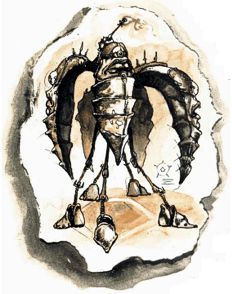
Pentadrone (Base Modron):
The highest of base modrons, pentadrones serve as the police of the base population and as intermediaries between the base modrons and the godlike (in their view) decaton hierarchs. The pentadrones receive instructions passed down by the rules of Mechanus and see that they are implemented by the quadrones, policing them as necessary.
As five-function beings, these creatures can communicate, operate, monitor, plan, and manage. They can also react to unplanned situations. In the armies of the modrons, a dozen of them are always assigned to each regimental headquarters as an elite unit, while others actually command the regiment.
These five-armed creatures resemble starfish on thin, stiltlike legs. In addition to powerful arm attacks and an effective 18/00 Strength score, pentadrones have a paralysis gas which they emit in a stream 2 feet in diameter and 5 feet in length. Any creature caught within this stream must successfully save vs. paralysis or remain immobile for five rounds. Pentadrones can use this gas stream no more than once every five turns, with a maximum of five uses per day. Alternately, the pentadrones can use this gas to levitate (as 5th-level wizards).
Pentadrones can survive virtually any environment, withstanding temperature extremes from 210 degrees to -100°F without discomfort. Cold, fire, and acid attacks receive a -2 modifier per die of damage. They are immune to illusion and mind-affecting magic, and only weapons of +1 or better enchantment will harm them.
Pentadrones have double human senses and double normal infravision (180-foot-range).
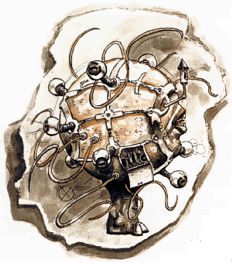
Decaton (Hierarch Modron):
The decatons are the lowest order of officials found in modron society. These creatures appeare as 10-tentacled sphered on stumpy legs. The are the overseers of the physical welfare of the base modrons, the voice of the great power to the working class. One decaton is assigned to each sector of the realm. while the remaining 36 serve on the staffs of the 36 legions of the modron army.
Decatons have spell ability equal to that of a 10th-level cleric, but they lack the ability to turn undead. They also have the following spell-like powers, which apply only to other modrons: cure 1 point of damage for all modrons within 144 feet, cure disease in a 12 foot radius, heal by touch up to 10 modrons per round, and remove paralysis by touch for up to 10 modrons per round. These powers are usable one at a time, at will, once per round. Curiously (as are most things modron), the powers affect all modrons whether the decaton recognizes the rank or not.
The spherical decatons fly by generating a light gas within their bodies, rendering them lighter than air. Generally they only rise into the air in order to get an overview of the situation when commanding modron armies.
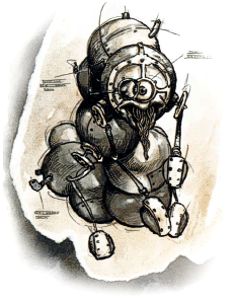
Nonaton (Hierarch Modron):
There are at least 81 nonaton posts identified in modron society, and there may be more. These cylindrical modrons act as commissars and chief inspectors of the modron universe. Nine nonatons carry the orders of the octons, 64 regulate the actions of the decatons on the 64 wheels of the realm, and eight monitor the loyalties of the decatons of the army. Each nonaton has ten decaton lieutenants, who in turn have five pentatons to serve them.
Nonatons have the spell powers of 11th-level clerics, plus the following spell-like abilities, usable at will, once per round: ESP, mirror image, slow, web, detect good/evil, detect lie, and detect charm. They may use power word, stun once per day.
Nonatons usually head investigations of rogue modron units and handle small-party invasions from other planes. In the latter case, they first attempt to detect the invaders’ intentions, then act accordingly.
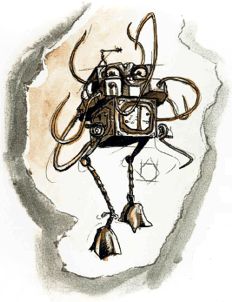
Octon (Hierarch Modron):
There are at least 64 octons, one in charge of each sector of the plane in the modron realm. These creatures govern the wheels and can command any armies stationed there. The lesser modrons of each cogwheel are considered wards of the octons, who guard their sectors quite rigidly and see that regulations are obeyed, routine is observed, and reports are invariably correct.
An octon moves through air and water by means of a circular collar at shoulder level which is part of the octon’s body. It forces air or liquid through the collar, giving the creature lift, propulsion, and a high amount of maneuverability. Eight tentacle-arms are attached to the outside of this collar.
Octons use spells as 12th-level clerics. They can also employ the following spell-like abilities at will, once per round, one at a time: water walking (as the ring of that name), haste, detect good/evil, and telekinesis (3,500-gp-weight maximum). They are immune to psionics.
Each octon has a personal staff of one nonaton, who in turn commands one decaton, who controls five pentadrones, then 16 quadrones, 81 tridrones, 256 duodrones, and 1,728 monodrones through the chain of command. These forces maintain towers which are smaller versions of the towers of the quartons, the secundi, and Primus, although they do not understand who built those structures.
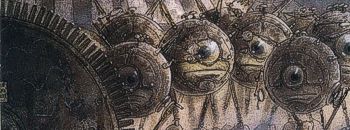
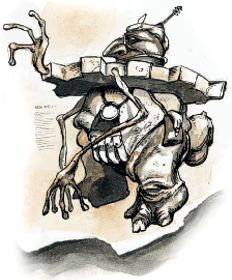
Septon (Hierarch Modron):
Septons are officials who maintain order and see that all regulations have been obeyed. Seven of them serve each hexton assigned to the quintons. The septons travel from place to place as inspectors and examiners of work and records, and they are charged with transferral of information from outlying areas to the towers of the regions, quarters, and the capitol tower itself.
Septons appear as humanoids with large bald heads. They have shoulder collars similar to those of octons, although they are smaller and, while insufficient to propel them through the air, they provide excellent transport underwater.
In order to assure the proper performance of their duties, each septon has seven senses which operate continuously: hearing, sight, smell, taste, touch, ESP (30-foot range), and detect magic. They also are powerful spellcasters, having the abilities of a 13th-level priest and a 12th-level wizard.
Septons, as with all hierarchs that do not have psionic ability, are completely immune to psionic attacks and combat.
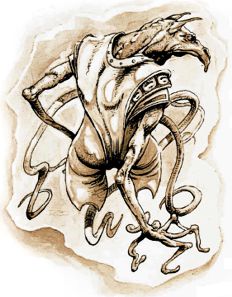
Hexton (Hierarch Modron):
The hextons fulfill several roles in modron life. First, they are the generals of the 36 modron armies. Second, six are attached to each of the wheels of the realm, where they maintain the chain of command in modron life. Another six serve at the tower of Primus, although they are not aware of his existence. There are undoubtedly more hextons, although no one has ever logged all their posts.
Hextons appear as humanoids with six arms – two large human arms with six fingers and four tentacles tipped with sharp claws below. They have thin, fanlike folded wings, joined at the shoulders.
Hextons use spells as 14th-level priests, but they have no special spell-like abilities other than those noted for all hierarch modrons. They are immune to all psionic attacks.
There is a 75% chance that any hexton will be accompanied by its personal guard: a staff of one septon, two octons, three nonatons, five decatons, and 25 pentadrones, all fanatic in their dedication to their orders.
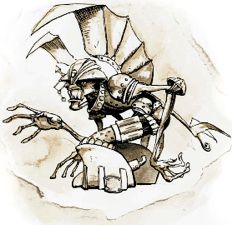
Quinton (Hierarch Modron):
Quintons are the major bureau chiefs and records keepers of Mechanus. Each has a sexton assistant, seven septons, and one octon as its staff. There are bureaus in each of the sectors and quarter towers, five main bureaus in Primus’s tower at the capitol, and each of these bureaus is headed by a quinton.
Quintons look like tall, stocky humanoids with four flexible arms jutting out from the shoulders. Prehensile tails serve as the creatures’ fifth arms. They have fanlike wings similar to those of the hextons. As a symbol of rank, the quintons have a diamond inscribed in their foreheads.
Quintons are capable of casting legend lore as if the questioned object or person were at hand (1d4 rounds). They may detect good/evil at will and may cast spells as 15th-level priests.
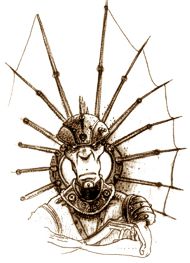
Quarton (Hierarch Modron):
Quartons administer the 16 sectors of the modron realm and oversee the operation of the bureau, sector governors, and army units attached to their regions.
Each quarton has a personal staff of those hierarchs assigned to his command, plus 36 pentadrones that act as a guard unit. (These pentadrones can only be told to guard the object resembling the quarton, without ever understanding its role or purpose in their lives.)
Quartons are 12-foot-tall humanoids with four jointed arms and fanlike wings. They cast spells as 16th-level priests.
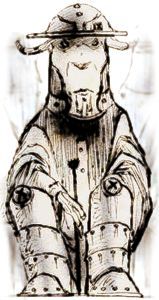
Tertian (Hierarch Modron):
Trial, judgement and sentencing of all creatures in the modron realm is the province of the nine tertians. They supervise the quartons and hear all crimes brought against the rigid orthodoxy of the realm. For the bulk of the modron population, the tertians are alien and unfamiliar, the ultimate impartial judges. If presented with a case against a duodrone, the base modron can only imagine (if it can imagine at all) the tertian to be some incomprehensible manifestation of the supreme logic – a “super-tridrone” so to speak.
Most judgments deal with modron rogues, i.e., any modron who strays from the proper order. In addition, the tertians pass on the orders of the secundi, to whom they all report.
Tertians look fairly human, except for their 12-foot height, the horns jutting from the sides of their bald heads, and their long prehensile tails that end in a macelike ball. Anyone struck by this ball must successfully save vs. paralysis with a -4 penalty to the roll or fall paralyzed until the tertian releases them. In addition, tertians may cast spells as 17th-level priests and 20th-level wizards. As with other hierarchs, they cannot use psionics, be also immune to them.
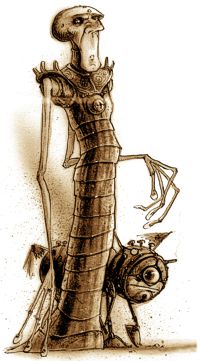
Secundus (Hierarch Modron):
The four secundi, viceroys of the quarters, are the virtual rulers of Mechanus, reporting only to Primus. Each secundus has a staff of two tertians, who in turn command other heirarchs.
The secundi appear as incredibly thin and tall humanoids with long, narrow faces and deep-set eyes. They cast spells as 18th-level priests and 20th-level wizards. If a secundus’s attack roll exceeds the number needed to hit by 5 or more, the victim is stunned until the secundus releases him, unless the victim is of demigod or higher status.
The secundi live in great towered cities near the centers of their quarters. They always live in harmony with one another, except during those extremely rare times when a new Primus must be chosen (see below).
Primus (The One and the Prime):
Primus is the ruler of all the modron realm. It and it alone understands the whole structure of the modron race, since it sits at its pinnacle. From there it decrees what is order, writes the laws, and establishes the rules and regulations. All other modrons exist to carry out the plans and obey the rules of Primus. Failure to meet this powerful creature’s standards will result in a modron being declared rogue and sentenced accordingly.
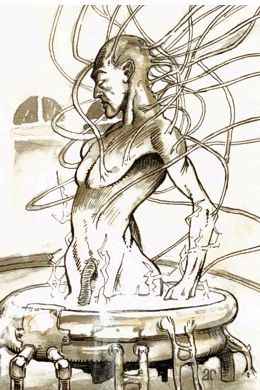
Primus is a huge being who rises from an energy pool in the central part of its great tower at the center of the plane (although Primus also may appear as a normal androgynous human). In giant form Primus’s hands are unseen, for the right one is swathed in bright rainbow hues and the left is covered with inky dark clouds.
Within Mechanus, Primus has the status of a greater power, except it is possible for Primus to die, albeit only under near-impossible conditions. Its sole concern is for the modrons. It does not send avatars to other planes or even take part in the normal bickering and wars of the planar powers. All modrons with priestly powers gain their spells directly from it.
The death of Primus does not break the link in modron society, for like all gaps, the vacancy is filled by promotion of the one of the secundi. However, the process usually creates turmoil since, without a Primus, chaos is allowed to enter into the perfection of modron society. Some scholars have mistakenly interpreted this chaos as civil war within this orderly race. The first act of the new Primus is to return order to its race, a process which can take some time.
Rogue Units
Even in the perfect modron world there is disorder, and sometimes this disorder strikes at the very fabric of the modron society. When this happens, a modron may go rogue. This is most common in the base modrons, although there are cases of a few hierarchs being affected this way (but certainly never any hierarch of quarton status or higher!). Rogue moderns do not act in accordance with Primus’s wishes and directives, but break laws, disobey orders, and sometime become violent. These rogues are hunted down, usually by the pentadrones under the command of the nonatons.
Once captured, the rogue is tried and sentenced according to the laws of Primus. For a lowly base modron, this is a bewildering series of events, as strange beings (hierarch modrons) describe the crimes committed and the punishment that is due. It can only seem like the judgment of angels upon a hapless mortal, and many sages would dearly love to know just what modron theology makes of the whole thing.
The Armies of the Modrons
There are 36 great armies in the realm of the modrons, each a powerful fighting force. Each of the 16 regions of the plane has its own army, and the secundi have two armies each, in addition to their regional forces. The tertians have three to aid in law enforcement and punishment. The final nine armies are stationed outside of Primus’s tower and serve as a reserve force, should they be needed.
Each army is commanded by a sexton and is comprised of four corps. Each corps is led by 40 pentadrones in a telepathic hook-up with the hexton general. Each corps has two divisions commanded by 20 pentadrones, and each division has four brigades led by 10 pentadrones. Each brigade has four regiments, each one being the standard tactical unit, led by five pentadrones. There are 70 officers, 192 NCOs, 252 messengers, and 2,628 line troops in a brigade, for a total of 3,142.
A regiment consists of two “battles” plus a squad of winged monodrone messengers and a special squad of 12 pentadrones. Each battle is led by four quadrones and consists of six companies of monodrones, two companies of duodrones, a special company or tridrones, a squad of quadrants, and another squad of messengers. The eight regular companies are each divided into two wings plus a headquarters unit. Each company consists of 12 squads and three officers. A squad numbers 12 troops and will contain an NCO of the same type as the troops. Special units of messengers, “shock troops” and the like may be attached to the headquarters’ units of brigades, divisions, and corps.

